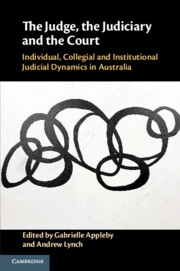 The Judge, the Judiciary and the Court
The Judge, the Judiciary and the Court Judicial Activism
from Part II - Debates and Challenges to the Judicial Role
Published online by Cambridge University Press: 04 May 2021
Perhaps one of the most enduring legal controversies in recent decades, at least in the public sphere, relates to the acceptability of ‘judicial activism’ as a practice on the bench. Activism, of course, has no fixed definition; nor is it a term that has been adopted with any great zeal by Australian practitioners or the academy. But there is no doubt that the early, benign (if simplistic) understanding of activism as a binary opposite to judicial restraint has been overshadowed by a particularly rancorous public debate about the supposedly growing numbers of progressive activists radically departing not from mere restraint but from judicial ‘orthodoxy’.
This chapter provides an up-to-date survey of the usages of the activist label in Australia, and contends that the rubric of activism obstructs, rather than buttresses, a sophisticated and robust critique of judicial decision-making. The increasing difficulty in untangling the language of activism from public understandings of judicial work is acknowledged, given that the nature of debate on the role of the judiciary has markedly changed in Australian political discourse over the last three decades. The chapter examines the reasons for the persistence of the unhelpful term, and examines the potential for the judiciary and wider legal community to push for public discourse to move beyond activism as a means of analysis.
To save this book to your Kindle, first ensure no-reply@cambridge.org is added to your Approved Personal Document E-mail List under your Personal Document Settings on the Manage Your Content and Devices page of your Amazon account. Then enter the ‘name’ part of your Kindle email address below. Find out more about saving to your Kindle.
Note you can select to save to either the @free.kindle.com or @kindle.com variations. ‘@free.kindle.com’ emails are free but can only be saved to your device when it is connected to wi-fi. ‘@kindle.com’ emails can be delivered even when you are not connected to wi-fi, but note that service fees apply.
Find out more about the Kindle Personal Document Service.
To save content items to your account, please confirm that you agree to abide by our usage policies. If this is the first time you use this feature, you will be asked to authorise Cambridge Core to connect with your account. Find out more about saving content to Dropbox.
To save content items to your account, please confirm that you agree to abide by our usage policies. If this is the first time you use this feature, you will be asked to authorise Cambridge Core to connect with your account. Find out more about saving content to Google Drive.